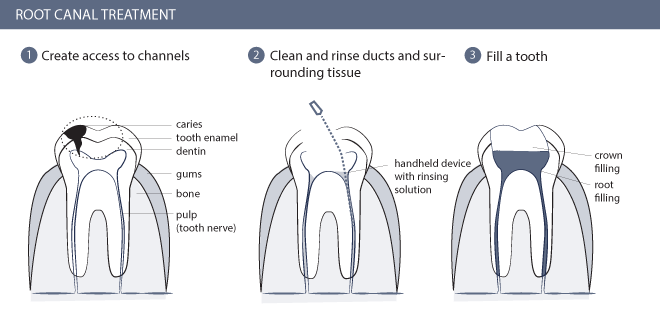
Root canal treatment facts
| Necessary for: | Inflammation of the pulp or tooth root, restoration of the tooth with an Onlay, Overlay or Crown, dead tooth nerve due to Caries, tooth trauma/ accident or periodontal diseases |
| Treatment method: | Mechanical + Laser |
| Anesthesia: | Local anesthesia / nitrous oxide / general anesthesia |
| Duration of treatment: | depending on the severity (on average 3 sessions 60-90min) |
| Costs: | depending on severity, scope and effort |
Root canal treatment ensures the preservation of a tooth that is severely damaged. It is therefore not necessary to remove a tooth whose pulp or root is inflamed. Tooth that has been damaged by an accident and traumatically dislocated or has a dead tooth nerve also does not need to be removed thanks to root canal treatment. As an experienced endodontist in Zurich, we have been working extensively in this area of dentistry for more than 20 years, focusing in particular on tooth preservation. It is very important to us to avoid tooth extraction and instead find a suitable endodontic treatment so that the tooth can be permanently preserved. Preserving your tooth means not having a gap, bridge or an implant.
Frequently asked questions about root canal treatment
How can root canal treatment be prevented?
Adequate oral hygiene at home by brushing your teeth twice a day can prevent the development of gingivitis, periodontitis and caries. Extreme sugar consumption should also be avoided. Regular professional teeth cleaning (dental hygiene 2/Year) in combination with a check-up should also be carried out at least once a year.
Does root canal treatment cause pain?
We carry out root canal treatment in our dental practice in Zurich under local anesthetic. Our patients therefore usually feel no pain unless the inflammation of the tooth is too acute or the nerve is already completely dead. Otherwise, slight pain may occur in rare cases during treatment. For our anxious patients, we offer sedation using nitrous oxide or general anesthesia.
When can I return to work after root canal treatment?
In most cases, you will be able to return to work immediately after the root canal treatment. However, we recommend that you rest on the day of treatment and only return to work the following day.
Is the pain gone immediately after root canal treatment?
Root canal treatment is carried out deep inside the tooth. The surrounding tissue can therefore cause slight pain, but this can be tolerated well. This can be alleviated using common painkillers. The pain disappears as the inflammation subsides.
Your advantages of root canal treatment in our practice

- 20 years+ of dental experience
- Modern clinic with air conditioning
- Comfortable state of the art dental treatment chairs with massage function
- 2D/3D Xrays for precice diagnostics and low radiation
- Enjoy your favorite Netflix program during treatment
- Succesful support of root canal treatments with modern Laser
Root canal treatment procedure
At our dental practice in Zurich, we will first conduct a personal consultation with you and examine your tooth. This enables us to determine whether root canal treatment is suitable for your individual case. If this is the case, we plan the treatment precisely using high-resolution X-ray images, which allow us to determine the course and extent of the root canal. We use 3D X-rays (DVT) to identify the extent of the inflammation. Finally, the treatment is painless and performed under local anesthesia. For our anxious patients, we also offer treatment in our dental practice in Zurich under nitrous oxide sedation or general anesthesia on request. We will be happy to advise you on the most suitable anesthesia method for you and determine this together with you in a consultation.
The focus of endodontology and our work is on preserving your natural tooth. The damaged interior of the tooth (tissue, pulp, dental nerve) reached via the dental crown is treated as follows. The root canal is cleaned and smoothed and the tooth is disinfected (Laser) and then filled with a special gutta-percha cement mixture. This prevents re-inflammation of the tooth due to remaining bacteria and germs inside the tooth. Tooth restoration with an Onlay, Overlay or Crown is necessary if there is a large degree of inflammation and especially in the posterior area of your mouth and, as a result, more of the tooth's substance has to be removed or if the tooth is exposed to a high level of stress in the lateral area. Most root-canal-treated teeth receive an Onlay, Overlay or Crown for stabilization and fracture protection. Root canal treatment for multi-rooted tooth usually requires two to three sessions at intervals of around two to four weeks.

Contact us
Zahnärzte am Löwenplatz
Seidengasse 20
8001 Zürich
Opening times
Monday - Friday: 7:00 am to 8:00 pm
NEW!
Zahnärzte am Löwenplatz Panorama
Seidengasse 20
8001 Zürich
on the third floor, elevator available.










